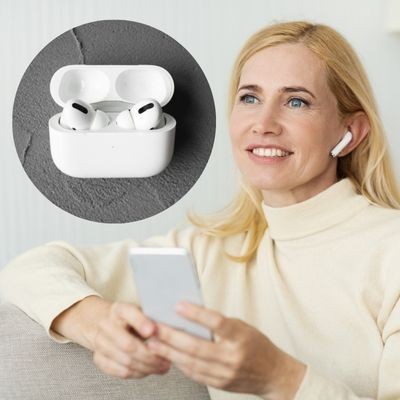
Head of Online Medical Content

Audiology Expert at Hearing Aid UK

Online Hearing Aids in the UK
Can I buy hearing aids online?
Overview | Mail-order companies and online dispensers | Our guidance and tips about hearing aids online | Summary
Buying hearing aids on the Internet
So, can you buy hearing aids on the internet? The simple answer to this is yes, you can. There are, however three completely different types of companies advertising hearing aids on the internet, and you must distinguish between the pair of them.
Buying hearing aids online has become increasingly popular due to convenience and accessibility. However, there are several key points to consider when purchasing hearing aids online.
Such as understanding your hearing needs, level of hearing loss, and the specific features that will benefit you the most. In this article, we go through these points you should know about before making a hearing aid purchase online.
Mail-order companies for hearing aids online
These companies can sell you hearing aids directly without any medical or professional intervention. The only benefit I can see in buying these hearing aids is that they’re cheap. Typically, between £50 and £250 each.
The main drawback is that the hearing aids are not programmed to match the individual’s specific hearing loss. Certain websites allow you to test your hearing, but this is only a vague indication as to whether or not you have hearing loss, not a complete audiological profile.
Online dispenser networks
There are a handful of “networks” of UK hearing aid audiologists on the internet, such as Hearing Aid UK. They put you in touch with a local independent hearing aid audiologist who can provide you with a free hearing test. If you need hearing aids, then they can offer the choice of any product on the market with an unbiased opinion.
Transparency on pricing is important
They usually publish their prices on their website and these hearing aid prices are typically 30% – 50% cheaper than high street companies or national chains. You should expect to pay £500 to £1500 per hearing aid – no more.
National companies can charge as much as £3000 per hearing aid, so there are good savings to be made.
It is of primary importance that a hearing impairment is checked out by a fully qualified professional. If you buy hearing aids, then you will probably wear them for at least 12 hours per day, 7 days a week.
Other hearing aid companies
These could be independents, chains, or national companies. Use the guidance below to select whether they are worth dealing with.

Buying Hearing Aids on the Internet
Our guidance and tips about hearing aids online
Online hearing aids are more accessible than ever
Every hearing aid company advertises on the Internet. Here are some tips to find the right hearing aids and the right company for you:
- Avoid any company that doesn’t display their full price list, as there is undoubtedly a reason for this – they overcharge.
- Avoid any company that isn’t specific about products and their prices. Some companies appear to publish price lists, but they disguise them by using names like “better range”, “best range”, and “ultimate listening range”.
- Avoid companies that rebrand their hearing aids. Some national companies have their hearing aid identities obscured by rebranding them. This clandestine practice is intended to prevent the consumer from comparing prices.
- The main hearing aid brands are as follows: Phonak, Oticon, Widex, Siemens, Starkey, Unitron, Bernafon, and Resound. Unless they publish these brands and are specific about the costs of the models then steer well clear.
- Avoid companies that don’t offer all makes of hearing aids. Most national companies are owned wholly or partially by a manufacturer, so their advice is less than independent. Even if the company in question is not owned by a manufacturer, they may only sell 2 or 3 makes of hearing aids. Looking at the list above, there are at least 8 manufacturers.
- Avoid the “fake local independent”. Many local independents have been bought out by a national company. They usually try to hide this by keeping their original name. As explained earlier, most national companies are less than independent. Check their website for a head office, or maybe just ask them.
Can I buy hearing aids on the internet?
In summary, the Internet is really like a big interactive newspaper. More and more people are using it as a resource to compare companies, products, and prices. I believe that the internet has heralded the beginning of the end for people overcharging in virtually any field.
Many online retailers offer hearing aids, ranging from basic to advanced models, and at varying price points. However, it is important to note that buying hearing aids online may not be the best option for everyone, especially if you have complex hearing loss or require personalised fitting and programming.
It is recommended that you consult with a licensed audiologist or hearing healthcare professional to determine the best hearing aids for your specific needs. They can also provide fitting and programming services to ensure that the hearing aids are properly adjusted for your hearing loss.
If you do choose to buy hearing aids online, make sure to do your research on the seller and the specific product you are interested in purchasing. Look for customer reviews, return policies, and warranty information before making a purchase.
Why Choose Us?
- FREE Hearing Tests
- Best Hearing Aids and Prices
- FREE Aftercare for Life
- FREE Home Visits
- 200+ Local Audiologists
- 60 Day Money Back Guarantee
Want more information about online hearing aids?
Buying hearing aids online can be a convenient option, but it requires thorough research, professional evaluation, and careful consideration of the seller's credibility, return policies, programming and adjustment services, warranty coverage, ongoing care, and follow-up support.
Call one of our audiologists today, free on 0800 567 7621 to discuss this article or to ask any questions about hearing aids or hearing healthcare.
Other hearing aid advice articles you might like...
 Do Hearing Aids Work for Everyone?
Do Hearing Aids Work for Everyone?  Wearing Hearing Aids with Glasses
Wearing Hearing Aids with Glasses  Risks of Wearing Apple AirPod Pro 2's
Risks of Wearing Apple AirPod Pro 2's What's included in our hearing aid prices?
Common FAQs about online hearing aids and hearing loss
If you are looking at this page then it is likely that an audiologist has suggested that you purchase this particular hearing aid, so is this the best model for you?
In general, any audiologist will always recommend to you the model that best suits your needs. Here is a useful checklist to make sure that is the case.
- Audiologist level of knowledge: The audiologist you have seen will hopefully have a wide knowledge of all available hearing aids, however, some will only be familiar with a small number of brands and therefore may not really be in a position to know which model is the best for you. It is OK to challenge their recommendation and ask them to justify why this particular brand is the one for you.
- Do research: Read about the hearing aid that was recommended. Does it seem like it will suit your lifestyle? Does it have more or fewer features than you need?
- Be aware of sales targets: Many high street retailers have specific tie-ins to a particular manufacturer/brand. The hearing aid they have suggested may still be the correct one for you, but do your research so that you know why they might have recommended it.
If in doubt, feel free to give us a call. That's what we're here for. In the meantime, read all about our review of the best hearing aids for 2025 here
If you have significant hearing loss in both ears, you should be wearing two hearing aids. Here are the audiological reasons why:
Localisation: The brain decodes information from both ears and compares and contrasts them. By analysing the minuscule time delays as well as the difference in the loudness of each sound reaching the ears, the person is able to accurately locate a sound source. Simply put, if you have better hearing on one side than the other, you can't accurately tell what direction sounds are coming from.
Less amplification is required: A phenomenon known as “binaural summation” means that the hearing aids can be set at a lower and more natural volume setting than if you wore only one hearing aid.
Head shadow effect: High frequencies, the part of your hearing that gives clarity and meaning to speech sounds, cannot bend around your head. Only low frequencies can. Therefore if someone is talking on your unaided side you are likely to hear that they are speaking, but be unable to tell what they have said.
Noise reduction: The brain has its own built-in noise reduction which is only really effective when it is receiving information from both ears. If only one ear is aided, even with the best hearing aid in the world, it will be difficult for you to hear in background noise as your brain is trying to retain all of the sounds (including background noise) rather than filtering it out.
Sound quality: We are designed to hear in stereo. Only hearing from one side sounds a lot less natural to us.
Fancy some further reading on this topic? You can read about why two hearing aids are better than one in our article, hearing aids for both ears, here
For most people, the main benefit of a rechargeable hearing aid is simple convenience. We are used to plugging in our phones and other devices overnight for them to charge up. Here are some other pros and cons:
For anybody with poor dexterity or issues with their fingers, having a rechargeable aid makes a huge difference as normal hearing aid batteries are quite small and some people find them fiddly to change.
One downside is that if you forget to charge your hearing aid, then it is a problem that can't be instantly fixed. For most a 30-minute charge will get you at least two or three hours of hearing, but if you are the type of person who is likely to forget to plug them in regularly then you're probably better off with standard batteries.
Rechargeable aids are also a little bit bigger and are only available in Behind the Ear models.
Finally, just like with a mobile phone, the amount of charge you get on day one is not going to be the same as you get a few years down the line. Be sure to ask what the policy is with the manufacturer warranty when it comes to replacing the battery.
Looking for more information on rechargeable hearing aids? Read our dedicated page on the topic here
For most people, the answer is yes. But it's never that simple.
The majority of hearing problems affect the high frequencies a lot more than the low ones. Therefore open fitting hearing aids sound a lot more natural and ones that block your ears up can make your own voice sound like you are talking with your head in a bucket. Therefore in-ear aids tend to be less natural.
However the true answer is we can't tell until we have had a look in your ears to assess the size of your ear canal, and until we have tested your hearing to see which frequencies are being affected.
People with wider ear canals tend to have more flexibility, also there are open fitting modular CIC hearing aids now that do not block your ears.
There is also the age old rule to consider, that a hearing aid will not help you if it's sat in the drawer gathering dust. If the only hearing aid you would be happy wearing is one that people can't see, then that's what you should get.
Most people can adapt to any type of hearing aid, as long as they know what to expect. Have an honest conversation with your audiologist as to what your needs are.
Generally speaking, six or more. Unless it's none at all.
The number of channels a hearing aid has is often a simplistic way an audiologist will use to explain why one hearing aid is better than another, but channels are complex and it is really not that straightforward. Here are some reasons why:
Hearing aids amplify sounds of different frequencies by different amounts. Most people have lost more high frequencies than low and therefore need more amplification in the high frequencies. The range of sounds you hear are split into frequency bands or channels and the hearing aids are set to provide the right amount of hearing at each frequency level.
Less than six channels and this cannot be done with much accuracy, so six is the magic number. However, a six channel aid is typically very basic with few other features and is suitable only for hearing a single speaker in a quiet room. The number of channels is not what you should be looking at, it's more the rest of the technology that comes with them.
As a final note, different manufacturers have different approaches. One method is not necessarily better than any other. For example, some manufacturers have as many as 64 channels in their top aids. Most tend to have between 17 and 20. One manufacturer has no channels at all.
Hearing aids are easily lost, misplaced or damaged and typically are one of the most expensive personal possessions an individual can own. We offer hearing aid warranty coverage for £80 per year per aid. Find out more about this service we provide here
All our audiologists use the very latest technology and provide the full range of tests to accurately measure your hearing for free. Find out about what hearing healthcare services we offer all our customers here
Hearing Aid UK offers all their customers free home visiting services, even in a care home environment, for no extra cost. Including hearing tests, fittings, maintenance, check-ups and much more in the comfort of your own home and at your convenience. Find out more information about our home visits here
Here, at Hearing Aid UK, we are dedicated to offering low hearing aid prices. We achieve this by having no head office and low marketing costs. Our hearing aid prices are amongst the lowest you will find anywhere in the world. Explore our prices, brands, and models here
Other pages you might find useful
Ask the Experts
6 Morton Lane
Walkwood
Redditch
Worcestershire
B97 5QA
Latest Launch
When we refer to a product as 'Latest Launch', we mean it is the latest to be released on the market.
New
When we refer to a product as 'New', we mean that the product is the newest hearing aid model on the market.
When we refer to a product as 'Superseded', we mean that there is a newer range available which replaces and improves on this product.
Older Model
When we refer to a product as an 'Older Model', we mean that it is has been superseded by at least two more recent hearing aid ranges.
